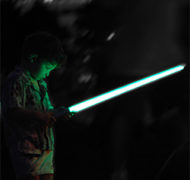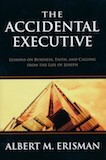Working Hard With Jake of Neverland
Blog / Produced by The High Calling
I’m sitting in the first part of a day-and-a-half meeting, one I was shoehorned into at the last minute. To attend this meeting means my work schedule, already jam-packed and high-stress, is wrecked. I should write a book of business theory called Management by Chaos.
For several months, this has been my work life—crisis-ridden, every day a frenzy of activity, more work piling up, important work forgotten or neglected in the crush of new priorities and new crises. It’s not pretty. Or much fun. Days often pass in a fog.
I’m sitting in this meeting, and I’m thinking about a sword fight.
Days before, my wife and I visited my oldest son. His house is the only place in the world where I’m greeted by a three-year-old voice yelling “Gampaw!” as the bundle of energy himself flies into my arms, followed by a one-year-old bundle of energy crawling as fast as he can behind his older brother.
We played trains (Brio and Thomas the Tank Engine), we play race cars, we play stuffed animals, and we have sword fights. I’m holding a Jake of Neverland pirate sword, which talks if you press the button. The three-year-old is holding a piece of orange plastic Hot Wheels racetrack.
En garde.
I’m not thinking about management by chaos, the crisis du jour, the stretch of meetings facing me in the coming week, the wall of work that is waiting at my office—a wall that will not be scaled any time soon.
I am thinking about lying on the floor, in the exact position dictated by the three-year-old, as we watch Jake of Neverland on television. This is the 21st century version of Peter Pan; the only characters I recognize are Captain Hook, Mr. Smee and the crocodile. But the two of us lie there, content just to watch, until the one-year-old comes crawling in search of us.
Unless you’re a grandparent, it’s difficult to understand the joy of grandchildren. It’s not just that you can give the kids back at the end of the day, or that it’s all the fun without the responsibility.
I’m with my daughter-in-law in the kitchen while she’s cooking and I’m feeding the baby something delightful like strained peas. About half of the spoonful of peas stays in his mouth while the other half dribbles down his chin. I scoop it up and push it right back in his mouth, laughing the whole time.
“It drives me crazy when he does that,” she says, “and you’re just cracking up.”
I nod, laughing as I scoop another chin-load. “You have so many things to do,” I say. “Food to cook, diapers to change, clothes to fold, dishes to wash, house to clean, all the stuff of little kids.” I pause, spooning another wad of green. “I just have to be.”
Kids need to understand the doing and the being. They need the structure of doing and the joy of being.
Grandparents need it, too.
I may be sitting in my day-and-a-half meeting, listening to yet another consultant tells us how to solve all our problems. It’s possible that we might listen this time. The work is important, often critical. We accomplish things that are often downright amazing.
But I’m thinking about work that is just as critical, just as important.
Like making goofy faces with a one-year-old in a high chair to distract him while you slip another spoonful or peas or carrots in his mouth.
Or laying out the Brio train track is some new convoluted and entertaining way.
Or crossing swords to see who will make off with the pirate’s treasure.
En garde.
Image by Dave C. Used with permission. Sourced via Flickr. Post by contributing editor Glynn Young, author of A Light Shining.





